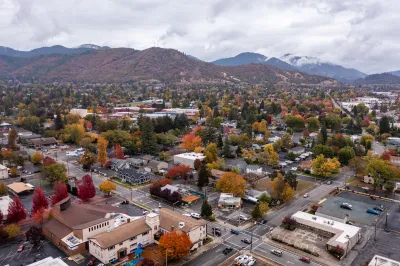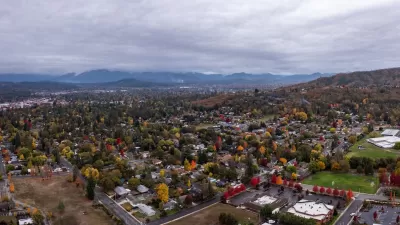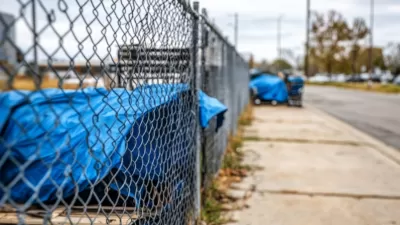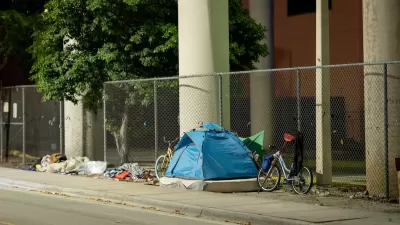The Oregon city will be barred from enforcing two ordinances that prosecute unhoused residents until it increases capacity and accessibility at designated camping sites.

A circuit court judge has barred the city of Grants Pass from enforcing two ordinances targeting unhoused people, reports Jeremiah Hayden in Street Roots.
The city became the focal point of policies addressing homelessness when the U.S. Supreme Court decided that Grants Pass could enforce criminalization ordinances despite not having enough shelter space to house everyone living on the street in the case of Grants Pass v. Johnson.
Now, an injunction issued by Josephine County Circuit Court Judge Sarah McGlaughlin requires the city to increase the capacity of its designated shelter or camping sites and provide accessibility at those sites.
According to Hayden, “Judge McGlaughlin ruled that with the exception of two parks — Riverside Park and Reinhardt Volunteer Park — the city cannot cite, arrest, detain, issue fines, or otherwise prosecute any person for camping on public property, nor can the city sweep residents from public spaces.” The ruling extends a temporary restraining order issued in February.
Although the U.S. Supreme Court ruled in favor of the city, Hayden explains that Oregon law “still prohibits cities from penalizing homeless residents when the number of shelter beds are insufficient.” The 2021 Oregon law also calls on cities regulating homelessness to consider “the impact of the law on persons experiencing homelessness.”
The article details the positions of local lawmakers, some of whom want to take a more punitive approach.
FULL STORY: Judge bars Grants Pass from enforcing anti-homeless ordinances while lawsuit continues

Alabama: Trump Terminates Settlements for Black Communities Harmed By Raw Sewage
Trump deemed the landmark civil rights agreement “illegal DEI and environmental justice policy.”

Planetizen Federal Action Tracker
A weekly monitor of how Trump’s orders and actions are impacting planners and planning in America.

The 120 Year Old Tiny Home Villages That Sheltered San Francisco’s Earthquake Refugees
More than a century ago, San Francisco mobilized to house thousands of residents displaced by the 1906 earthquake. Could their strategy offer a model for the present?

LA’s Tree Emergency Goes Beyond Vandalism
After a vandal destroyed dozens of downtown LA trees, Mayor Karen Bass vowed to replace them. Days later, she slashed the city’s tree budget.

Sacramento Leads Nation With Bus-Mounted Bike Lane Enforcement Cameras
The city is the first to use its bus-mounted traffic enforcement system to cite drivers who park or drive in bike lanes.

Seattle Voters Approve Social Housing Referendum
Voters approved a corporate tax to fund the city’s housing authority despite an opposition campaign funded by Amazon and Microsoft.
Urban Design for Planners 1: Software Tools
This six-course series explores essential urban design concepts using open source software and equips planners with the tools they need to participate fully in the urban design process.
Planning for Universal Design
Learn the tools for implementing Universal Design in planning regulations.
Ada County Highway District
Clanton & Associates, Inc.
Jessamine County Fiscal Court
Institute for Housing and Urban Development Studies (IHS)
City of Grandview
Harvard GSD Executive Education
Toledo-Lucas County Plan Commissions
Salt Lake City
NYU Wagner Graduate School of Public Service





























